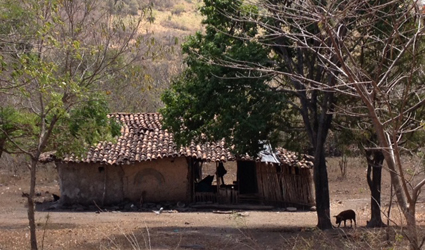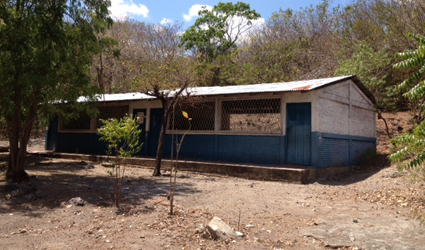In July 2015, GRID Alternatives installed an off-grid photovoltaic system on a primary school in the community of Totumblita.
The community of Totumblita, consisting of 19 homes and 180 inhabitants, is tucked behind a forgotten corner of the town of Ciudad Dario, Matagalpa. The government authorities refuse to repair the road leading to the community, making the community virtually inaccessible during the rainy season.
 There is no grid electricity here and the community has made do with candles, kerosene lamps and flashlights to light their homes. Kerosene lamps are not only expensive but also dangerous for indoor use. They are a fire hazard, and emit fumes that can cause chronic respiratory illnesses like asthma.
There is no grid electricity here and the community has made do with candles, kerosene lamps and flashlights to light their homes. Kerosene lamps are not only expensive but also dangerous for indoor use. They are a fire hazard, and emit fumes that can cause chronic respiratory illnesses like asthma.
Totumblita is very poor compared to surrounding communities. The majority of its residents live off the land, growing beans, corn and wheat in this very arid part of the region. Some residents commute to the town of Dario and work as a door-to-door salespeople selling housewares, small gadgets and cleaning supplies. Neither occupation provides much income for the average family.
Every house in Totumblita has at least one cell phone, but since there is no electricity, residents walk an hour to the nearest house with electricity to charge their phones. There is a local well for potable water but community members say there is not enough water in the well, and there are disputes over water rights. The women of the community walk everyday down a steep hill every day to fetch water for their homes.
 Despite the hardships that this community has endured, the people of Totumblita are determined to improve the quality of life in their community. This is exemplified in their efforts to construct the first school in the community in 1994, in cooperation with the organization Seeds of Learning. They organized a committee and put in all of the labor to haul the materials and build the school. The community was very proud of their school and wanted to see electricity installed there. The school consists of two classrooms where first through sixth grade is taught. One teacher, Professor Ramón, commutes on a daily basis from the town of Dario to teach class to 15-20 students.
Despite the hardships that this community has endured, the people of Totumblita are determined to improve the quality of life in their community. This is exemplified in their efforts to construct the first school in the community in 1994, in cooperation with the organization Seeds of Learning. They organized a committee and put in all of the labor to haul the materials and build the school. The community was very proud of their school and wanted to see electricity installed there. The school consists of two classrooms where first through sixth grade is taught. One teacher, Professor Ramón, commutes on a daily basis from the town of Dario to teach class to 15-20 students.
The photovoltaic system GRID volunteers installed provides lights for the school and AC power, allowing the school to serve as a central charging place for cell phones and other appliances that improve the quality of life in the community.

